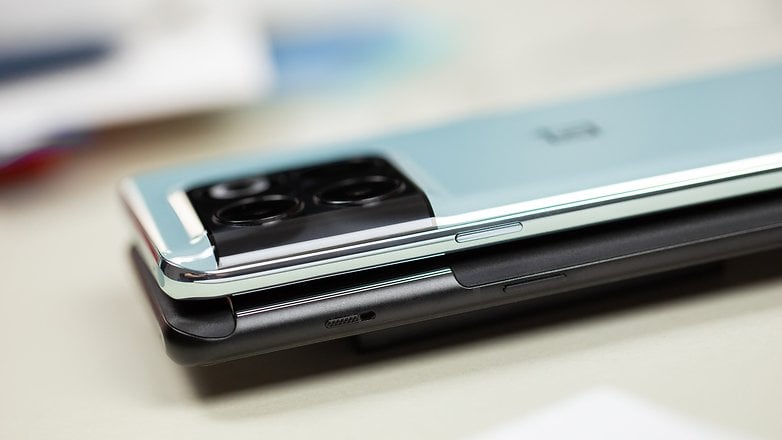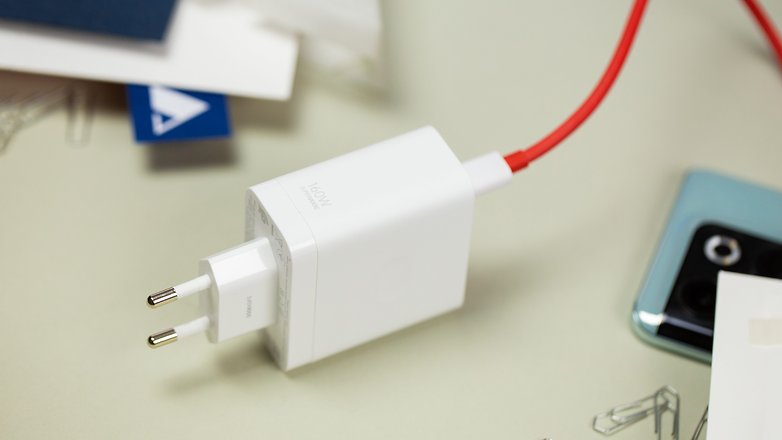
OnePlus announced the OnePlus 10T as the flagship for the second half of the year a few days ago. In the first half of the year, it was the OnePlus 10 Pro that received four stars in our review. Now we’ve just reviewed the OnePlus 10T 5G with the same result. This is reason enough to compare both models here and to work out the differences. Let’s start with the technical specifications:
| OnePlus flagship for the 1st half of 2022 | OnePlus flagship for the 2nd half of 2022 | |
|---|---|---|
| Product | ||
| Image |
 |
 |
| Display | 6.7-inch Fluid AMOLED with LTPO 2.0 3216 x 1440 pixels, 120 Hz |
6.7-inch Fluid AMOLED with LTPO 2.0 2412 x 1080 pixels, 120 Hz |
| SoC | Qualcomm Snapdragon 8 Gen 1 | Qualcomm Snapdragon 8+ Gen 1 |
| Memory | 8 / 12 GB RAM | 128 / 256 GB internal | 8 / 16 GB RAM | 128 / 256 GB internal |
| Software | Android 12 with OxygenOS | Android 12 with OxygenOS |
| Rear camera | Main camera: 48 MP, f/1.8, PDAF, OIS Ultra wide angle: 50 MP, f/2.2, 150˚ FoV, AF Telephoto: 8 MP, f/2.4, PDAF, OIS, 3.3x optical zoom |
Main camera: 50 MP, f/1.8, OIS, PDAF Ultra wide angle: 8 MP, f/2.2 Macro: 2 MP, f/2.4 |
| Front camera | 32 MP, f/2.2, 1/2.74″, 0.8 µm | 16 MP, f/2.2 |
| Battery | 5,000 mAh 80 Watt Quick-Charging, 50 Watt wireless Wireless Reverse Charging |
4,800 mAh 150 Watt Quick-Charging no wireless charging |
| Connectivity | 5G, LTE, Wi-Fi 802.11 a/b/g/n/ac/ax, 2×2 MIMO, Bluetooth 5.2 | 5G, LTE, 2×2 MIMO, Wi-Fi 802.11 a/b/g/n/ac/ax, Bluetooth 5.3 |
| IP | – | – |
| Colors | Volcanic Black and Emerald Forest | Moonstone Black and Jade Green |
| Dimensions and weight | 163 × 73.9 × 8.6 mm, 200.5 g | 163 × 75.37 × 8.75 mm, 203.5 g |
| Pros |
|
|
| Cons |
|
|
| Rating | Full review of the OnePlus 10 Pro | Full review of the OnePlus 10T 5G |
| Check offer* | – |
Jump to:
Display and casing
If we look at the specifications, the two panels do seem to be almost identical: 6.7-inch “Fluid AMOLED” panels, both armed with a 120 hertz refresh rate. However, there are several differences between the OnePlus 10 Pro and the 10T: The former comes with LPTO 2.0 technology and a higher resolution. In addition, the 10 Pro has rounded sides, which we do not see in the OnePlus 10T.

Visually, OnePlus has stayed true to itself and continues the design language we already saw on the OnePlus 10 Pro. The camera array is arranged a bit differently, but this difference is not worth mentioning if we disregard the missing “Hasselblad” lettering. More noticeable is the omission of the alert slider, which was not well received by many OnePlus fans.
Apart from that, the two models share the missing IP certification, the missing slot for a memory card, and the missing 3.5 mm jack. A slightly weaker display, lack of an alert slider—these factors combine to deliver a point for the OnePlus 10 Pro.
Performance and connectivity
However, the OnePlus 10T wants to make up for its shortfall in the performance category. The Chinese manufacturer has installed the Snapdragon 8+ Gen 1, which delivers even more performance than the predecessor Snapdragon 8 Gen 1. The even more efficient cooling system and the upgraded working memory also underline that OnePlus is serious about the performance of the new model. The model with 128 GB (non-expandable) storage still has 8 GB of RAM.
Unlike the OnePlus 10 Pro, which launched with 12 GB of RAM in the 256 GB version, OnePlus now offers 16 GB of working memory on the 10T. In terms of connectivity, the 10T is also ahead with Bluetooth 5.3 vs Bluetooth 5.2. The bottom line is this: we are dealing with two very powerful devices, of which the OnePlus 10T is the stronger one in this department.
Cameras
It sounds like the advantages see-saw section to section here, as OnePlus has slimmed down the camera quite a bit in the 10T. This does not apply to the primary camera as OnePlus uses Sony’s IMX766 sensor with 50 MP in the 10T. The results are usually at least as good as those in the 10 Pro. But the rest falls quite short compared to the OnePlus 10 Pro.

This begins with the missing Hasselblad support on the 10T and continues with halving the selfie camera’s resolution to 16 MP, and finally ends with the missing telephoto lens. Unfortunately, OnePlus replaced it with a functionally useless 2 MP macro sensor on the 10T. I simply assumed that OnePlus could also put a sticker of a sensor in place of this macro cam and nobody would miss anything.
Nevertheless, really good pictures can be taken with both the primary camera and the ultra-wide-angle camera, and the night mode is on par with the OnePlus 10 Pro. If we can really say that the OnePlus 10T has a weakness, then it is most likely to be found here in the triple camera.
Software
We do not have to spend much time here, because the two rivals are absolutely on par in terms of software. OxygenOS 12.1 which is based on Android 12 is used in each case. Even better: As soon as OxygenOS is ready with Android 13, the OnePlus 10 Pro and the OnePlus 10T will receive the update later this year.
We do not have to say much about OnePlus’ Android update policy either, since the manufacturer offers three major Android versions and four years of Android security updates. In this respect, OnePlus is quite exemplary and just behind Samsung.
Battery and Quick Charging
The constant ups and downs also continue with the battery. On the one hand, the 10T charges incredibly fast at up to 160 watts. The 4,800 mAh battery is charged to 100 percent in just 19 minutes. In contrast, the slightly 10 Pro’s larger 5,000 mAh battery lags behind a bit with its “only” 80 watts of charging speed. And yes, that is nitpicking on a very high level.

Where the complaining pays off, on the other hand, is that OnePlus has put its pedal to the metal when it comes to wireless charging. While the 10 Pro can also be charged wirelessly with 50 watts and even handles wireless reverse charging, we do not find either of these on the OnePlus 10T. Too bad for the latter!
Price and availability
Both models are available in two variants: with 8 GB RAM and 128 GB storage and with 12 or 16 GB RAM and 256 GB storage. The 10 Pro was launched for $899, with the 256 GB device priced at $999. The price difference of the two OnePlus 10T models also is $100. However, the fun begins at $649, while the larger capacity model will cost you $749.
The price of the OnePlus 10 Pro has just dropped with the launch of the 10T, but you still have to pay $799 for the smaller capacity model and $899 for the 256 GB version. You will have to wait a bit longer for the OnePlus 10T though: The devices will be available from August 25, and you can pre-order them from August 11.
Conclusion
If we were to finally compare both models, we have to conclude that both have their respective strengths: Those who want the most powerful OnePlus smartphone with the fastest quick-charging should go for the OnePlus 10T. Those who want to take better photos and do not want to live without the alert slider or the adaptive display options of the LPTO 2.0 technology should buy the OnePlus 10 Pro.
To be honest, I still don’t know exactly where the company’s journey is headed, and the OnePlus 10T isn’t particularly helpful in letting me settle for an answer. Personally, there are a bit too many compromises in the 10T compared to the Pro model to place it on par as a flagship.
However, as is often the case, your opinion is important: If you are looking for performance and do not care about a telephoto lens or an alert slider, you can of course go for the 10T by all means. However, my favorite is the OnePlus 10 Pro.
Feel free to write us in the comments on what you think!






